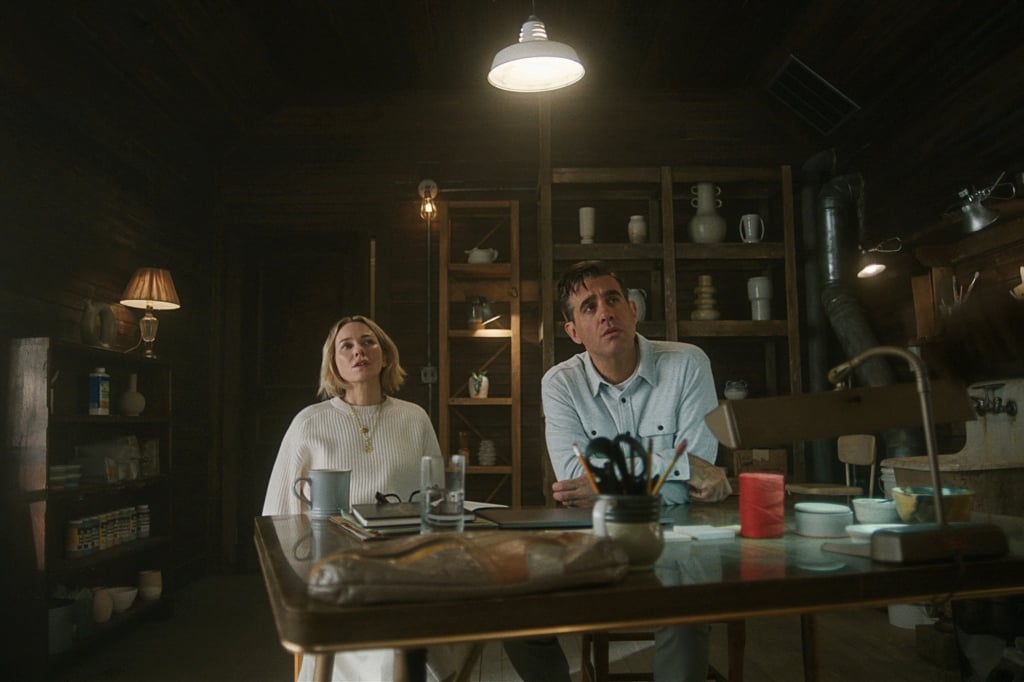As it’s gone on, Ryan Murphy’s Netflix deal has revealed how many topics fascinate him — and how rigidly fixed in the past are his manners of addressing them.
Has he been able to get beyond the franchises he started on FX? Consider, for instance, his recent smash “Dahmer – Monster: The Jeffrey Dahmer Story”; the surfeit of punctuation in the title seems to suggest a sublimated desire to call it what it is, another installment of the true-life “American Crime Story” in all but name. “Halston’s” gilded retelling of recent-ish celebrity culture recalled “Feud,” with the adversaries, perhaps, being the designer and his own ego. And now, with his new series “The Watcher,” Murphy has reverse-engineered an “American Horror Story,” taking a true story and finding within or beyond its nuances some Murder House melodramatics.
Adapted from Reeves Wiedeman’s 2018 New York magazine story, “The Watcher” tells the story of Dean and Nora Brannock (Bobby Cannavale and Naomi Watts, with two children played by Isabel Gravitt and Luke David Blumm), whose heavily leveraged purchase of a dream home in a New Jersey hamlet is swiftly complicated by the ambient presence of evil. The neighbors (played by, among others, Mia Farrow, Richard Kind, and Margo Martindale) take an instant dislike to the Brannocks, making each of them initial suspects as the writer of eerie poison-pen letters from an unnamed “watcher,” trying to scare the family into moving away.
As written by Wiedeman, the story is a nightmare optimized for the age of Zillow; the real-life family at its center (the Broadduses, rather than the Brannocks) live in a purgatory of suspicion, unable to trust the intentions of neighbors who seem benign or quirky. Here, the people the Brannocks meet often open from a position of outré hostility, ironing out much of the magazine story’s insight about the ways in which suburban rage veils itself in politeness.
In Murphy’s typical way, there are plot twists — deaths and revivals, with the specter of the supernatural seeming to wax and wane. After awhile, the sense that anything is possible comes to mean that nothing surprises us, a bad thing for a show with at least a toe in earthbound, every-homeowner’s-nightmare drama. The grandness of the Murphy method collides with the truly interesting elements of the Watcher story. To wit: The couple at its center, as written, are somewhat vain and careless in their pursuit of a home beyond their reach. Their refusal to leave a house haunted by ghosts or by human evil is colored by the fact that they can barely afford to stay there, let alone sell at a loss. In the first season of “American Horror Story,” Murphy told a story about a house whose inhabitants faced down weirdos and maniacs sent as tormentors; why bother taking a story that thrums with relatable tension just to do that plot once more?
The cast does acquit themselves well. Naomi Watts has been asked to do more interesting work in the genre in the films “The Ring” and “Funny Games,” but is strong here, though underwritten (her career as an artist is underexplored, while marital tension she feels is more gestured at than shown). Cannavale, when his character’s growing mania over what his family is enduring is given space to breathe, is excellent. Jennifer Coolidge, as the realtor who sold the Brannocks their home, and Noma Dumezweni, as a sleuth helping them, stand out as the people the family meets who have real richness and dimension. Eventually, most other characters on the show come to seem as flat and two-dimensional as the board on which Dean keeps track of his investigation.
It has been an interesting moment for Murphy, whose possibly waning Netflix deal recently bore a toxic kind of fruit. His cumbersomely titled series on the life of Jeffrey Dahmer is an undeniable zeitgeist hit, even as it’s drawn sharp criticism for its indulgence of violence and its blithe treatment of real-life murders. Here, he veers in a different direction, not wallowing in the horror of what one family experienced but using that as a basic template for a somewhat zany, zippy whodunit. By the time we reach a coda demonstrating the trauma and dislocation both Dean and Nora feel, it’s almost hard to know how to take it: Their world is one of so little gravity that it’s hard to understand, based on the oddity and randomness we’ve seen up until the show’s ending, why these characters in an unrelatable, ultimately unremarkable fiction didn’t just bounce back.
Love Film & TV?
Get your daily dose of everything happening in music, film and TV in Australia and abroad.
“The Watcher” premiered on Netflix on Thursday, October 13.
From Variety US































